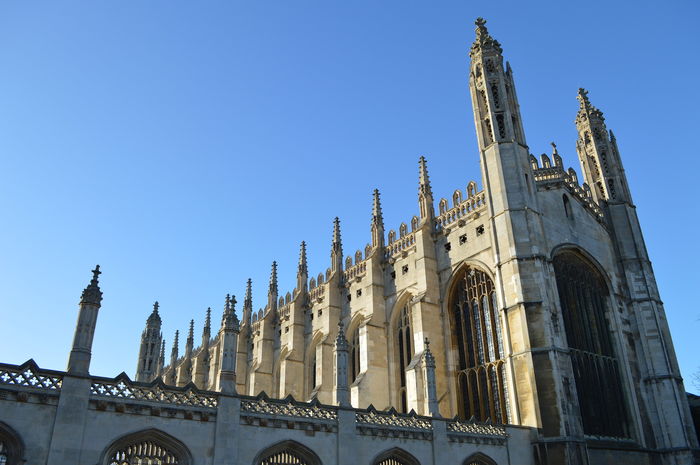Motion calls for college accommodation to be available to ‘those in need’ during pandemic
The motion passed with 98% of the vote at an online CUSU Council meeting on Monday evening

A motion, which encourages colleges to make their vacant accommodation available to 'those in need', was passed with 98% of the vote at an online CUSU meeting on Monday evening.
The motion asks colleges to pledge empty accommodation to the City Council’s Housing Register, for it to be allocated unconditionally to rough sleepers, domestic abuse victims, asylum seekers and released detainees.
There were 43 votes in favour of the motion, zero votes against and one person abstained from voting.
PhD students Ayse Polat, Matt Mahmoudi and Niyousha Bastani co-authored the motion, and call for colleges ‘to allocate as much of their en-suite and hostel housing as possible, especially their off-college accommodation, to those in need during this public health crisis’.
In the University’s current ‘red phase’, many College-owned residences are currently not at full capacity, after students were encouraged to leave Cambridge in March. Some students, particularly those whose return home would mean putting family members with underlying health conditions at risk, and students from areas particularly badly affected by Covid-19, have remained in college accommodation.
“The City Council is trying to accommodate an already heartbreaking scale of homelessness in Cambridge, but this is exacerbated by the current state of the economy”
In early April, Oxford City Council acquired student accommodation from Oxford’s University and Pembroke Colleges to house rough sleepers.
The motion’s authors explain that homelessness in Cambridge has been exacerbated by the Covid-19 lockdown.
Despite already high rates of rough sleeping in the city, the lockdown has increased rates of unemployment as some workers are not eligible for the Government’s furlough scheme.
UK councils have been ordered to address rough sleeping during the lockdown, with some hotels being used to provide accommodation for those currently without a permanent residence.
Polat explained that “the City Council is trying to accommodate an already heartbreaking scale of homelessness in Cambridge, but this is exacerbated by the current state of the economy”.
Homelessness in Cambridge is much higher than the national average. Meanwhile, domestic violence figures have increased sharply since lockdown began at the end of March.
CUSU Welfare and Rights Officer, Stella Swain, highlighted that poor funding of support services has created a situation in which domestic abuse victims “are looking for help which just doesn’t exist. They’re not homeless, but they’re in a violent situation that they can’t leave because if they did leave they would be homeless”.
Mahmoudi argues that the motion is necessary “to make sure that we make use of the space we have for people who find themselves in situations that cannot even be remedied by couch surfing at the home of a friend”.
He continued: “as an institution which prides itself for helping with the Kindertransport and sees itself as a bastion for supporting refugees and scholars in exile, it feels like this motion is something that the University should implement”.
The authors of the motion suggest that colleges should provide accommodation for free. They claim that colleges are not currently gaining money from vacant accommodation, so there is no additional loss.
Polat pointed out that no college has yet raised concerns about the financial implications of providing accommodation to those in need.
Mahmoudi explained that one barrier to implementing the suggestions which are included in the motion is that colleges are currently dealing with other logistical issues.
From ongoing discussions with colleges, Mahmoudi explains that there are many “sympathetic parties” who “want to push this through”, but that this is challenged by college members who “are concerned with crisis management and keeping the older fellows safe”.
He added that any resistance from colleges “is not so much that they object to the proposal itself, but due to concern about the security and safety of their older fellows, as well as limited capacity to support students who have stayed behind in college accommodation”.
Polat explained that concern for fellows was taken into account when the motion was written. Fellows often live in on-site accommodation so the motion specifically encourages making off-site accommodation available.
There has previously been concern that homeless people have not made use of the provision of council-managed accommodation in Cambridge. The current pandemic and ‘stay-at-home’ orders, however, may have rendered this resistance inappropriate.
A template for similar college-specific motions has also been produced for college committees. It is hoped that this template will be used by JCRs and MCRs to encourage individual colleges to align themselves with the proposals.
 News / Cambridge academics stand out in King’s 2026 Honours List2 January 2026
News / Cambridge academics stand out in King’s 2026 Honours List2 January 2026 Interviews / You don’t need to peak at Cambridge, says Robin Harding31 December 2025
Interviews / You don’t need to peak at Cambridge, says Robin Harding31 December 2025 Comment / What happened to men at Cambridge?31 December 2025
Comment / What happened to men at Cambridge?31 December 2025 News / Varsity’s biggest stories of 202531 December 2025
News / Varsity’s biggest stories of 202531 December 2025 Features / “It’s a momentary expression of rage”: reforming democracy from Cambridge4 January 2026
Features / “It’s a momentary expression of rage”: reforming democracy from Cambridge4 January 2026











